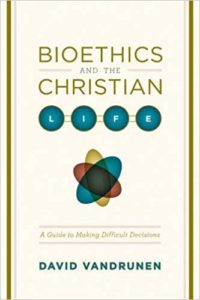
Bioethics and the Christian Life: A Guide to Making Difficult Decisions, by David VanDrunen. Wheaton: Crossway, 2009.
Christians grappling with beginning and end of life issues will welcome this fine book by minister, attorney, and theologian David VanDrunen. He asserts that “[b]ecoming a morally responsible bioethics decision-maker is the task of a lifetime and cannot be reduced to figuring out the right answer at a particular moment of crisis. Bioethical decisions must be made within the context of lifelong growth in Christian maturity” (15). He is persuaded that “having a firm and knowledgeable theological foundation is crucial for living the Christian life well” (17). The pages that follow reveal a solid grasp of scripture and Christian doctrine, as well as an informed understanding of contemporary bioethical debates, scientific data, and medical care. His impressive learning complements his admirable sensitivity to the deep hurts and intense struggles that confront Christians in times of disappointment and crisis.
Part 1 (the Foundations of Bioethics) surveys several approaches to public health care options, and encourages Christian participation in the health care system and public debates.
The author expounds the theological doctrines at the foundation of Christian decision-making, beginning with the bedrock truth of God’s sovereignty. “The sovereignty of God refers to the idea that God not only knows all things comprehensively – past, present, and future – but also has planned and ordained all things such that everything, from the greatest event of history to the most obscure, comes to pass according to the counsel of his will. Scripture informs us that the sovereignty of God is a source of great comfort and encouragement for believers in Christ… Perhaps no doctrine promises to shape our general attitude toward bioethics more profoundly than this one.” (40)
The doctrines of God’s sovereignty exercised for the benefit of his people, human responsibility, and man as image bearer of God are handled capably. I found particularly helpful VanDrunen’s reflections on human beings, who as image bearers of God, were created to live, both in the present age and the age to come. “Being image bearers of this God revealed in Genesis 1 means pursuing an active and productive life of benevolent dominion over the world” (47). By his fall in Adam man forfeited eschatological life. But the reality of death should not cause us to depreciate the value we place on life now. Rather, we should prize it all the more: not only do we understand God’s affirmation of life at creation, but also his extraordinary work to secure man’s redemption and eternal life through Jesus Christ.
From the theological foundations of responsible decision-making, the author moves to the virtues that accompany wise choices. One of the many strengths of this book is the time VanDrunen takes to develop a theology of virtue. A virtue is “a character trait that orients or disposes a person to act in a good way” (69). “Scripture calls us not only to act in certain ways but also to be a certain kind of people. If we are to put into practice the kind of life that Scripture commends, then we must be the kind of people who are able to do so.” (93-94) Virtues cannot be obtained in the heat of crisis, but must be cultivated deliberately over the course of a lifetime. Six virtues are studied: faith, hope, love, contentment, courage, and wisdom.
Part 2 explores beginning of life issues: marriage and celibacy, procreation and infertility, contraception, and the size of families; issues created by technologies that permit assisted reproduction (artificial insemination by husband, artificial insemination by donor, and in vitro fertilization); and the status of the human embryo, especially as it relates to abortion and stem-cell research.
Part 3 explores end of life issues: suicide, euthanasia, the distinction between killing and letting die, the decision of whether to accept and forgo treatment, and persistent vegetative state.
Dr. VanDrunen states clearly and fairly the various options available, and distinguishes between some that Christians must reject as clear violations of scriptural commandments or necessary inferences from them, and decisions which belong to the category of Christian liberty.
Matters of Christian liberty demand particular care; they must be made with reference to Christian doctrine and virtue.
One example: a couple decides whether to pursue treatment for infertility. Although this a decision that falls within the category of Christian liberty, couples must act thoughtfully. The author contends that “[o]ne distinctive way in which Christians ought to respond to infertility is with the virtue of contentment. To say that Christians should be content in the face of infertility is not to suggest that they may never do anything to remedy their infertility. But Christians first ought to strive after contentment in their infertility and only then to consider what, if anything, to do to remedy it. . . . Christian contentment has nothing to do with attaining peace through the disappearance of all earthly problems. Instead, Christian contentment is about finding peace in the midst of our suffering. It is about feeling satisfaction, joy, and gratitude before God even if our problem never goes away.” (124-125) Therefore, Christian couples must not become bitter about their childlessness ;discontentment is a failure to trust God’s providence. Nor should the virtue of courage give way to fear and motivate couples to pursue medical treatment for infertility out of anxiety about growing old without children.
Bioethics and the Christian Life will prove a valuable resource for Christians facing tough beginning and end of life decisions. Pastors will find it a helpful addition to their pastoral theology and counseling libraries.